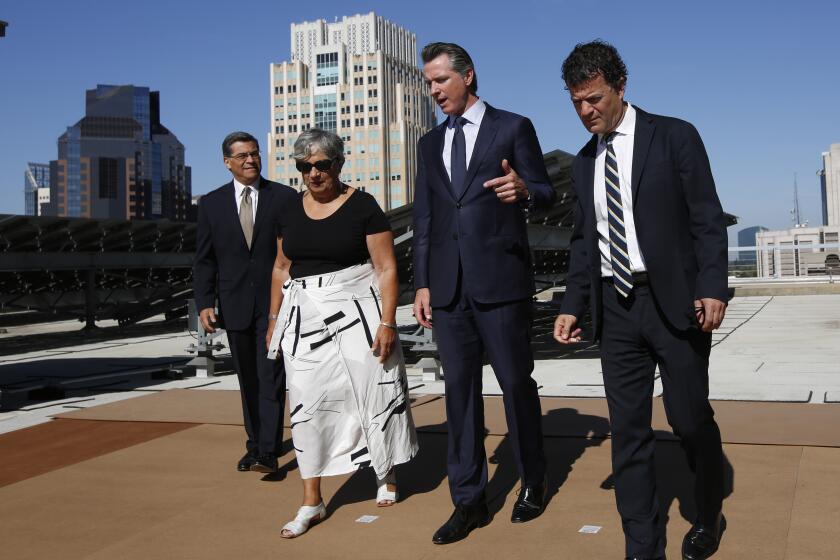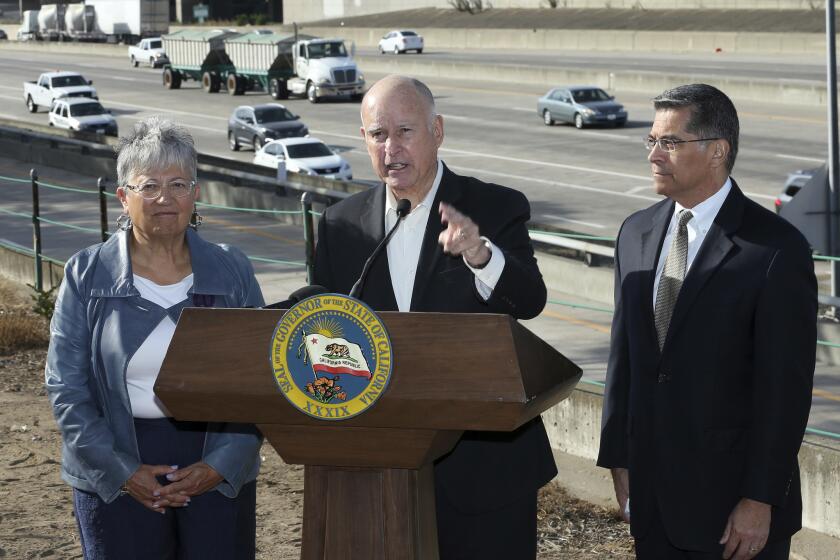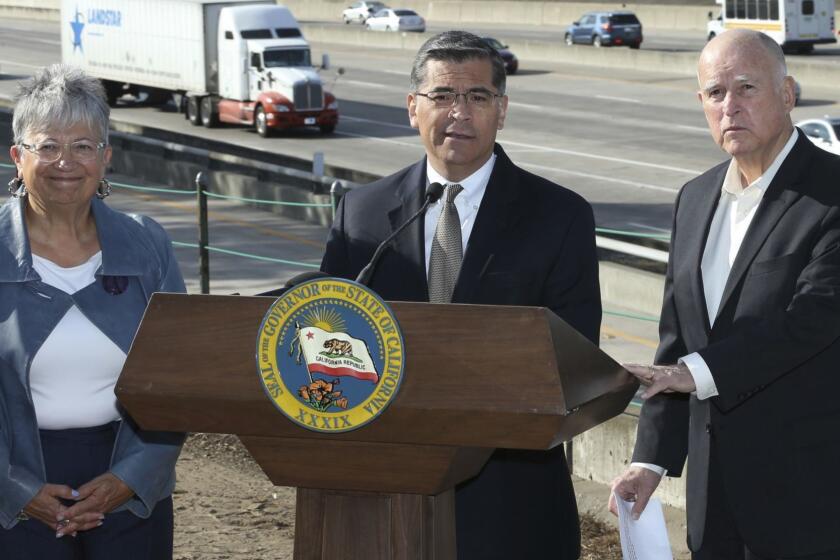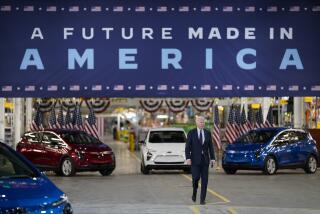Column: By siding with Trump on emissions, GM, Chrysler and Toyota are asking for industry chaos
General Motors, Fiat Chrysler and Toyota say the reason they’re backing the Trump administration in its assault on California’s decades-old campaign to reduce auto emissions is to avoid fragmenting the industry in search of a single national environmental standard.
Yet by their action, they’re widening a gulf between four other major automakers that have voluntarily agreed to comply with California standards and the rest of the industry.
What’s wrong with this picture?
We had an obligation to intervene.
— John Bozzella, auto industry lobbyist
The question arises in the aftermath of the announcement Monday by GM, Fiat Chrysler and Toyota as members of the so-called Coalition for Sustainable Automotive Regulation. Those companies and the coalition, which includes such other manufacturers as Subaru, Hyundai, Mazda and Nissan, filed a brief for the defense — that is, the Trump administration — in a lawsuit challenging its effort to roll back existing auto emission and mileage standards.
The lawsuit was filed by a group of environmental and consumer groups led by the Environmental Defense Fund in September, about a week after a similar action filed by California, 22 other states, the District of Columbia, and the cities of New York and Los Angeles.
An industry lobbyist said the manufacturers don’t exactly share the administration’s goal of rolling back emissions standards; they just want to ensure that one single standard governs the entire U.S., rather than two — the administration’s, and California’s.
“With our industry facing the possibility of multiple, overlapping and inconsistent standards that drive up costs and penalize consumers, we had an obligation to intervene,” said John Bozzella, who serves as both spokesman for the coalition and chief executive of the Assn. of Global Automakers, a leading trade group. “The decision to intervene in the lawsuit is about how the standard should be applied, not what the standard should be.”
Is that so? Raise your hand if you think the automakers would be supporting Trump if he were proposing tighter, rather than looser, standards on auto emissions than California. Anyone? Anyone?
Trump’s authority to revoke California’s waiver from federal clean air rules rests on a very shaky legal foundation.
For all their talk about wanting a single national emissions standard, GM, Fiat Chrysler and Toyota are fomenting a split within their own industry, since Ford, Honda, BMW and Volkswagen reached agreement with California earlier this year to voluntarily honor the state’s standards. That agreement drew fire from the administration, in the form of an antitrust investigation launched by the Department of Justice.
The risk in the move by GM, Fiat Chrysler and Toyota is that it will harden the positions of both the Trump administration and California, leaving the dispute to remain in the lap of federal courts. That’s a formula for years of uncertainty over emissions and mileage standards, which the industry rightly fears most.
The truth is that what’s happening is a political fight launched by Trump against California, which he sees (rightly) as a progressive bulwark against his retrograde policymaking. The rollback of emissions standards and the attack on California’s authority to set its own rules are merely part of a broader war, which most recently has comprised an attack on the state’s cap-and-trade program and threats to withdraw federal highway funds.
President Trump’s petty, absurd war with California plumbs new lows as he tries to invalidate the state’s cap-and-trade anti-pollution agreement with Quebec.
Let’s take a quick run through the background of this particular schoolyard rumble.
California’s greenhouse gas emissions standards as they apply to passenger vehicles are the focus of the conflict. By extension, these affect auto mileage standards, since making cars more fuel-efficient results in lower emissions.
Normally, such environmental regulations are reserved for the federal government. Congress, however, has waived the federal preemption as it applies to emissions by granting California the right to set its own rules, as long as they’re at least as stringent as the federal rules.
In one form or another, the congressional waiver dates back to 1970. California’s waiver applications have almost invariably been granted — a rejection by the George W. Bush administration was overturned by the Obama White House, which approved the most recent waiver in 2013.
California’s policies have resulted in a measurable improvement in regional air quality while representing a blow against climate change, which results in part from the emission of greenhouse gases. The state’s auto emission rules have also been adopted by 12 other states accounting for about 40% of the domestic car market.
This situation has long stuck in the auto industry’s craw. The industry has always cast its objection as a plea for a single nationwide standard, but that’s just blowing smoke; if the manufacturers really cared about consistent regulation, all they have to do is comply with California’s rules nationwide.
California’s climate deal with automakers shows the proper solution to Trump is to go around him.
Their real concern is that the existing rules set a high bar. Mileage standards adopted by the Obama administration and currently in effect call for average vehicular fuel efficiency of 54.5 miles per gallon by 2025. The industry says that goal will be impossible to meet given the structure of the U.S. auto market, where ownership is composed of two-thirds fuel-guzzling SUVs and light trucks and one-third passenger cars.
The Trump administration, which never met an environmental rollback it didn’t like, moved almost immediately upon taking office to undermine the Obama rules. Eventually, its plan surfaced as a cut in the mileage goal to 37 miles per gallon, and a proposal to revoke Callifornia’s waiver authority completely.
As I reported last year, the administration’s published backup for its proposed rule changes was risible. The proposal stated that reducing fuel efficiency would reduce auto fatalities because the more stringent mileage rules would prompt manufacturers to make lighter cars, which are more dangerous; the better mileage would prompt car owners to drive more, which is more dangerous; and higher-mileage cars would be more expensive, so people would stick with their older cars, which are more dangerous.
Picking apart this fatuous rationale was too easy. A response by experts at 11 leading universities termed the administration’s analysis “misleading” and “at odds with basic economic theory.”
Meanwhile, American Honda issued a blistering comment asserting that Trump’s plan “invites litigation and regulatory uncertainty, stalls long-term strategic industry planning, puts at risk American global competitiveness, exacerbates climate-related environmental impacts, and slows industry readiness for a widely acknowledged … transition to vehicle electrification.” Even more to the point, Honda concluded that the existing rules were almost certainly “safer” than the proposal. (The italics were Honda’s.)
There was a fair amount of perplexity at the California Air Resources Board on Feb. 21, when the Trump administration abruptly announced that it had decided to “discontinue discussions” with the state’s air quality regulator over the administration’s proposal to gut federal auto emissions standards.
As for the argument for revoking the California waiver, legal experts say it’s thin at best. The administration contends that the state’s clean air standards are tantamount to mileage regulations, which are preempted by federal law. However, two federal court rulings, both based on a 2007 decision by the Supreme Court, already have upheld California’s regulations even though they might have an impact on fuel economy rules. In any event, federal law has no provision allowing the government to revoke a clean air waiver once it’s been issued.
The administration undoubtedly is irked by California’s determination to forge its own path. That’s evident from the agreement the state’s Air Resources Board announced in July with Ford, Honda, BMW of North America and Volkswagen that upholds the gist of the existing regulations. The agreement represented a bit of a compromise on mileage, with the companies agreeing to meet a standard of about 50 miles per gallon by 2026.
It’s hard to glean how the automakers think their futures will be strengthened by forming an alliance with Trump. If they’re hoping that the courts will strike down the California waiver, that’s a bet with long odds. Bozzella told reporters during a conference call on Monday that the companies hope they can forge an agreement on mileage “that is supported by all the parties.”
But their action makes a national agreement less likely, not more. “Don’t take the companies’ word seriously that they want compromise,” says Ann Carlson, an environmental law expert at UCLA. “The idea that intervening in a case on the side of the Trump administration could be part of a compromise is silly.”
Plainly, the path to a single national standard runs through California. Not only are its rules followed by states comprising 40% of the car market, but the four companies that reached agreement with California account for nearly one-third of auto sales in the U.S. Either way you count, the states with the biggest car sales and four of the top 10 automakers in the U.S. market are already in accord. California’s initiatives arguably have all the momentum in effectively creating a national standard.
The Trump administration is trying to hold back the tide, and the smart money says it’s more likely than not to be swamped in the end. GM, Fiat Chrysler and Toyota risk ending up floating in the brine alongside it.










